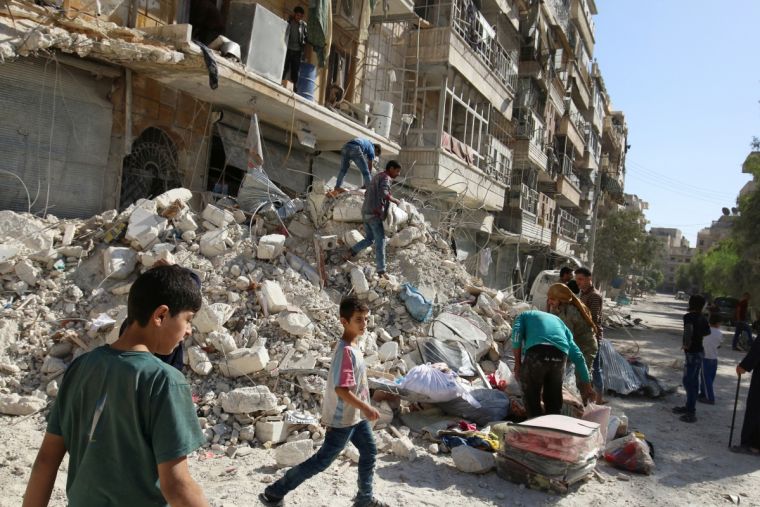Trapped Civilians Could Leave Aleppo On Thursday, As Russia Announces Brief Ceasefire

Thousands of civilians trapped in the besieged city of Aleppo in Syria could be able to leave on Thursday after Russia announced it would hold an eight-hour ceasefire.
The Russian Defence Ministry said on Monday that it would pause attacks to allow civilians and rebels passage out of the city.
The UN estimates that 275,000 people are currently trapped in the east of Aleppo.
But Moscow ruled out a lasting ceasefire, a step that Western governments have been demanding, saying that would only give Islamist rebels in the city an opportunity to regroup.
The United Nations, which has long called for weekly 48-hour humanitarian pauses in the fighting, welcomed the Russian announcement.
"Any lessening of the violence, lessening of the fighting, any pause that's actually implemented, would be very much welcome," UN spokesman Stephane Dujarric told reporters.
"We will use whatever pause we have to do whatever we can. Obviously there is a need for a longer pause in order to get [aid] trucks in," he said.
Russian aircraft and Syrian forces loyal to President Bashar al-Assad have been bombarding rebel-controlled districts of Aleppo since the collapse of an internationally-brokered ceasefire last month.
The US and some European states have accused Moscow and Syria of committing atrocities such as deliberately targeting civilians, hospitals and aid deliveries, but Russian officials deny that and accuse the West of abetting terrorists.
Speaking at a briefing in Moscow, Lieutenant-General Sergei Rudskoy, a senior Defence Ministry official, said rebels in parts of Aleppo were killing civilians while Western governments turned a blind eye.
"Given the situation, a unilateral ceasefire makes no sense, since Jabhat al-Nusra and groups allied to it will once again be given a breather, will regroup and restore their military capability," Rudskoy said, referring to a rebel group previously allied to al Qaeda.
He said Russia was working with other powers to achieve a peace deal for Aleppo, but that would take time, so in the meantime it had decided to initiate a humanitarian pause.
The pause is intended "first and foremost so that civilians can move freely, for the evacuation of the sick and wounded, and also for the removal of rebels," he said.
"On Oct. 20 from 0800 (0500 GMT) until 1600, a humanitarian pause will be implemented in the area of Aleppo. For that period, Russia's air force and Syrian government forces will halt air strikes and firing from other weapons," he said.
Speaking in London on Monday, a Catholic nun who works in Aleppo to coordinate and deliver emergency aid supplied by Aid to the Church in Need described the horror of living under constant bombardment.
"The tears of grief have become dry from too much sadness but our people are persisting and resisting, awaiting the dawn but unable to see the horizon," Sister Annie said.
"They suffer silently and cry with no tears. The dreams of our people were great in the past when they dreamed and dreamed of the possibilities for their lives, but this brutal war has not left any place without destroying it: the country's infrastructure, the people themselves together with their hearts and dreams."
Earlier this month, the Archbishop of Canterbury, Justin Welby, said the bombardment of Aleppo was "demonic" and shows "absolute contempt for the human spirit".
In an interview with ITV News, Welby said: "What is being done is evil, it is demonic, it is the absolute contempt for the human spirit, for the dignity of the human being. It is the brushing aside of the poor and the weak and the fragile, in a way that is as bad as anything we've seen in the last century."
The Archbishop also called for Syria's President Bashar al-Assad to stand down, saying that to do so would be "heroic".
Additional reporting by Reuters.











